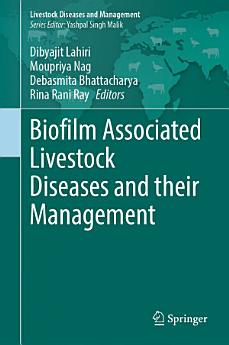Biofilm Associated Livestock Diseases and their Management
About this ebook
This book serves as a great resource for researchers, veterinary practitioners and students by addressing these critical issues and providing a comprehensive understanding of biofilm dynamics in livestock infections, fostering improved diagnosis and treatment methodologies.
About the author
Dr. Dibyajit Lahiri Associate Professor, Department of Biotechnology, University of Engineering and Management Kolkata.,
Dr. Dibyajit Lahiri is at present is working as Associate Professor in the Department of Biotechnology, University of Engineeringand Management, Kolkata. His research interest is precisely on biofilm isolated from human prosthesis and its inhibition by various novel phyto and nano compounds. He is keen to explore the molecular mechanism behind the removal of biofilm by natural compounds. His research arena also encompasses computational drug development by using of bioinformatic. His work is regularly being presented and appreciated before a number of experts of National and International repute. He has more than 100 publications. Dr. Lahiri has edited 8 books. He is also in the role of associate editors of various journals of international reputes.
Dr. Moupriya Nag
Moupriya Nag is presently working as Associate Professor in the Department of Biotechnology, University of Engineering & Management, Kolkata. Her research interests includes single molecule Biophysics of protein unfolding/refolding and protein aggregation kinetics and its mechanism of action especially the amyloid proteins in neurodegenerative disorders. Recently, her research focuses on functional amyloids in bacteria and their relation in forming biofilms. Her work deals with developing novel antimicrobial and anti-biofilm compounds from natural sources including plants, microbes and green synthesized nanoparticles. She has about seven years of teaching experience in Biophysics, Bioinformatics, Bioprocess and Biotechnology, Enzyme Technology, Computing, Molecular Modelling and Drug Design. She has also published many research articles in the peer-reviewed international journals and authored/edited or co-authored/edited numerous books/book chapters. She is also a member of many scientific societies like Indian Biophysical Society and Indian Science Congress Association.
Dr. Rina Rani Ray
Dr. Rina Rani Ray joined the Department of Biotechnology as Associate Professor in 2017. She has done her doctoral research in the Department of Microbiology, Bose Institute, Kolkata and was awarded Ph.D. degree from University of Calcutta in 1996. Since then she is working on different branches of Microbiology including enzyme biotechnology, metal bioremediation and fungal biotechnology. She has successfully completed three minor and three major research projects funded by different sponsoring agencies like UGC, DST and DRDO and is working on one ongoing project sponsored by DBT, WB. She has published more than 75 research papers in various national and international journals. Two students are awarded and one has been registered for Ph.D under her sole supervision. She is in the editorial board of many reputed journals. Dr. Ray has served in various reputed post graduate colleges under West Bengal Education Service including Presidency College and Bethune College for last twenty years, where she also acted as convenor and Chairperson, PGEC respectively. She is the member of various scientific associations and was nominated fellows of Zoological Society, India and Academy for Environment and Life Sciences, India. Dr. Ray has already edited 4 books and has publications in many journals of national and international resputes.
Dr. Debasmita Bhattacharya
Dr. Bhattacharya is currently Professor at Department of Basic Sc Debasmita Bhattacharya obtained her Masters and Doctoral degree in Cellular, Molecular and Integrative Physiology, Faculty of Health from York University. She did her Post-Doctoral fellowship in Dr. David Hood’s lab at York University. At present, her research focusses on the functional outcome of mitochondrial transplantation in stem and progenitor cells. She is also investigating the implications of lysosomal malfunction in cellular model and finding strategies to mitigate it in order to improve health. She has proven expertise in stem cell biology, cellular physiology, cancer biology, mitochondrial biology and exercise physiology. One of her studies entitled “p107 mediated mitochondrial function controls muscle stem cell proliferative fates” has been published in Nature Communications and has been appreciated by eminent scholars in the field. Bhattacharya has disseminated her research through peer reviewed journal articles, as well as poster and oral presentations at top tier academic conferences. Currently she is a Professor at Humber College, Canada in Biotechnology and Biomedical Sciences Department.







